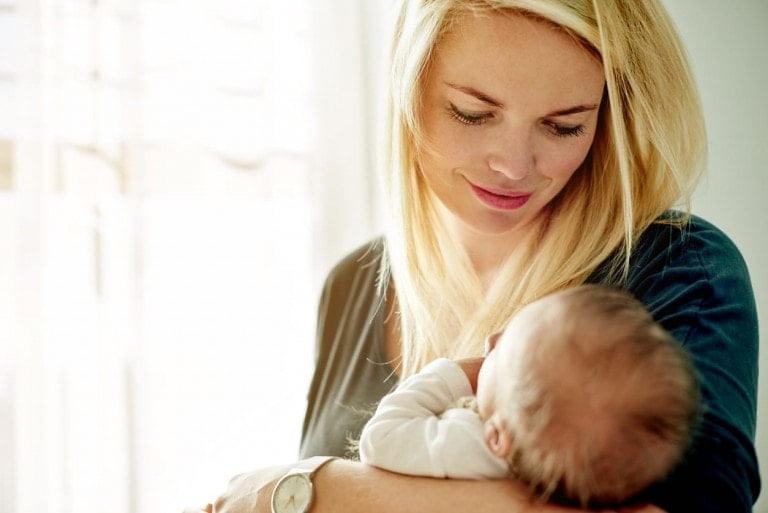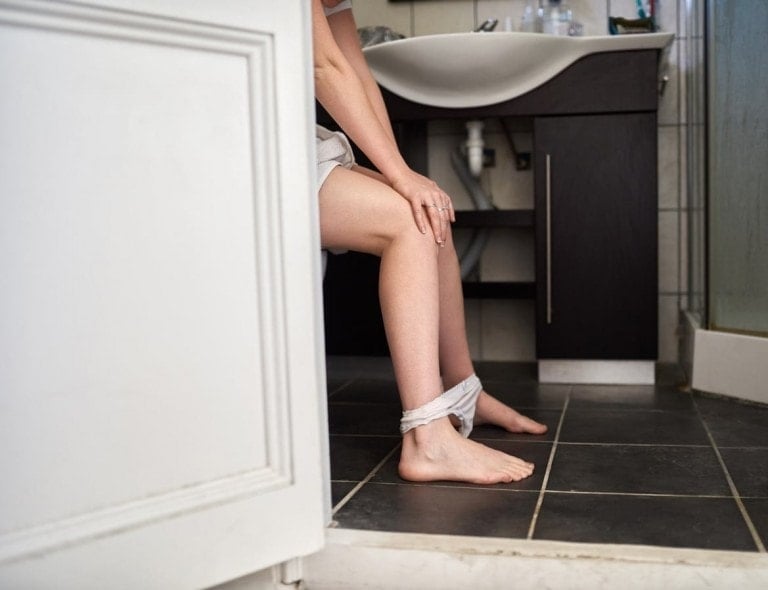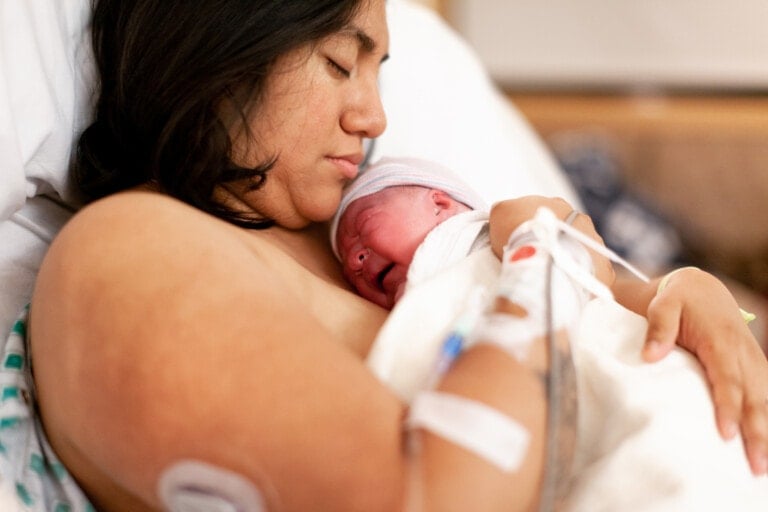We spend a lot of time preparing for birth and bringing home our new babies during pregnancy. But who prepares moms for what to expect for their physical recovery postpartum? We spend so much time worrying about our new babies that we forget to research whether our after-birth symptoms are normal.
Women’s bodies go through so much during pregnancy, and the postpartum period brings a ton of adjustments as we return to our pre-pregnancy states. Besides our organs reorganizing and bellies shrinking, we are healing from vaginal childbirth or a C-section. Many moms are also adjusting to breastfeeding, all while caring for a newborn on little sleep. Among these changes during the postpartum period, there may be some strange symptoms, some of which may not seem related to pregnancy. Rest assured that as weird as they may be, the following symptoms after birth are normal and commonly experienced by new mothers.
Weird But Normal Symptoms After Giving Birth
The Baby Blues
The term “baby blues” refers to feelings of sadness and tearfulness after giving birth. A new mother experiences physical trauma and significant disruption to her life and routine. She is often physically and emotionally challenged as well as exhausted. The changes she has been through affect her family and relationships and her physical, emotional, and mental health. Logically, all these sudden changes can cause weepiness as a mom adjusts to her new way of life. Sudden hormonal shifts that occur postpartum may also contribute to crying episodes.1
These sad feelings and tearfulness are normal; they do not indicate something is wrong with the mother or baby. They also do not mean the mother is unhappy to be a mom or have a new baby. Baby blues should fade around two weeks postpartum, and if these symptoms are worsening or not improving, you should consider talking to your doctor about postpartum depression.1
Postpartum Body Odor
Many women note an increase in body odor after giving birth. My friends and I often joke about the number of new deodorants we tried in the postpartum period to control what felt like an uncontrollable stench. Although you may not be a fan of your smell, it serves a purpose. Believe it or not, your baby likes it! Newborns have a very sharp sense of smell, possibly because the brain’s smell center develops very early in the womb.2
One study showed that smelling its own mother’s odor soothed newborn infants’ crying and increased mouthiness. This demonstrates that postpartum heightened maternal body odor can facilitate bonding and breastfeeding, despite being an unpleasant symptom to a new mom who may already feel gross.3
Hair Loss
Postpartum hair loss is a weird but common symptom after giving birth, with studies showing that 30%-50% of women experience this.4 It most often begins between eight and 16 weeks postpartum. Most women who experience postpartum hair loss report that the hair is lost most noticeably from the front corners of their hairline, but you may lose hair from any part of your scalp. It takes four to six months for hair growth to return to normal, but you start from scratch in these areas, so patchy bald spots where regrowth is noticeable may be present for much longer.5 Those flyaways at the front of your ponytail are called “baby hairs” for a reason!
Night Sweats
When your sleep is already fragmented by a hungry newborn, waking drenched and uncomfortable due to postpartum hot flashes and night sweats can be particularly unwelcome. In one study, nearly one-third of women reported hot flashes in the weeks following delivery. This symptom is related to the sudden and sharp drop in estrogen and other hormone fluctuations and often manifests itself overnight.6 During pregnancy, your body also retains lots of fluid, and sweating is one way to rid the body of excess fluid that is no longer needed after delivery. Night sweats may last 4-6 weeks.
If the night sweats are particularly disruptive, try catching up on sleep during the day, wearing loose-fitting cotton clothing, sleeping on a towel, changing your sheets frequently, and sleeping with a fan. Decreasing your caffeine and spicy food intake may also help reduce the frequency and severity of hot flashes and night sweats.
Chills
You may have experienced shivering and chills during labor, even if you were not cold. This is also a common phenomenon postpartum, which can be uncomfortable, surprising, and disruptive. In the hours to days after giving birth, your teeth may chatter, and your body may shake uncontrollably, like when you step outside in winter without a coat. Although strange and seldom talked about, this postpartum symptom is normal. It is likely related to drastic hormonal changes and fluid shifts immediately after delivery.7
Try not to fight the shivers, as resisting the shaking can cause tears in your C-section incision or vaginal scars. Ride them out, and they will be over before you know it. If these chills and shivers are not accompanied by a fever and other signs of infection, they are nothing to worry about and will pass. If you are concerned, it can never hurt to mention it to your doctor.7
Cardiac Symptoms
Your heart experiences a lot of stress and changes during pregnancy. Blood volume increases by 50%, blood pressure fluctuates, and cardiac output rises. Hormone fluctuations can make pregnant women more susceptible to irregular heart rhythms. While some of these irregularities are harmless, others are not.8
After giving birth, your heart should slowly return to its pre-pregnancy state. This return to normal can feel unusual because you may have gotten used to the feeling of your heart rate and blood volume during pregnancy. Anxiety, pain, and postpartum uterine contractions can all contribute to the feeling of a racing or pounding heart. You may also pay more attention to physical sensations during pregnancy and postpartum, making you perceive your pounding heart as palpitations.
While the occasional racing heartbeat is typical and rarely is cause for concern, pay attention to any other symptoms that may accompany it, such as fainting or lightheadedness, shortness of breath, and swelling in the feet and legs. These could be signs of peripartum cardiomyopathy, a rare but serious condition.9 If you are concerned about any cardiac symptoms you experience, reach out to your medical provider.
Vaginal Discharge and Odor
Whether you had a vaginal birth or a C-section, vaginal bleeding and discharge are expected symptoms after giving birth. Your uterus is cleaning itself from nine months of pregnancy and shedding all its remaining tissue and lining. In addition, the wound where your placenta has detached from the uterus is healing and may be bleeding. Because this discharge consists of blood, bacteria, tissue, and cervical mucus, it may have a stale, musty, or metallic odor.10 Changing your pad frequently can help curb the smell, but you should not use tampons or insert anything else into the vagina in the first six weeks postpartum or until your provider has checked you.
This postpartum discharge is called “lochia.” It progresses from dark red in the first few days to light reddish pink during the first two weeks to yellow or white for up to six to eight weeks. Passing small clots is expected in the first few days, and discharge flow slowly decreases from heavy to light. Saturating a pad per hour for more than two hours could be a sign of hemorrhage, so keep an eye on the blood flow and reach out to your doctor if you are concerned.10
Constipation
Hard stools that are difficult and uncomfortable to pass are common postpartum. Women may also experience the feeling of incomplete bowel emptying, pain, and straining for a bowel movement. Postpartum constipation may be caused by pregnancy hormones, prenatal vitamins, perineal pain from delivery, hemorrhoids, and eating habits during labor, delivery, and the immediate postpartum period.11
Some new mothers may hold their stool for fear of pain when passing it, especially if they have had perineal trauma or repairs. Bearing down can be difficult for women who have had a C-section because it increases abdominal pressure. Constipation may be stressful, uncomfortable, and frustrating for the new mother, but it is normal and will improve with time. In the meantime, maintain fluid intake, eat lots of fiber from fruits and vegetables, and get some movement in if possible.11 If you are uncomfortable, you can also talk to your doctor about trying a stool softener or laxative. (Here are some tips to help with passing your first poop postpartum.)
Incontinence
Some women experience urinary incontinence, or leaking of urine, during pregnancy. It is a common experience, especially while laughing, sneezing, coughing, or running. It is also a common symptom after giving birth, even if you did not have this symptom during pregnancy. Damage to the muscles and nerves of the pelvic floor from pregnancy and childbirth can cause decreased control over the muscles that control the start and stop of your urine flow.12
This pelvic floor damage can also cause anal incontinence when you leak gas or stool involuntarily. An estimated 13% to 25% of women experience some form of anal incontinence, and those who gave birth vaginally are at the greatest risk. Fortunately, this often resolves within three months postpartum.13
Healthy bladder habits, such as using the bathroom frequently and when needed, being relaxed when using the toilet, ensuring total emptying of the bladder each time, and doing pelvic floor exercises can help prevent and heal postpartum pelvic floor damage.14 Special awareness and mindfulness of your pelvic floor while doing activities that cause your incontinence can help decrease leakage. If it becomes a problem for you, many women report success from seeing a pelvic floor physical therapist.
While most weird but normal symptoms after giving birth are unpleasant, the good news is they mostly resolve on their own. The best thing you can do postpartum is to focus on your new baby and healing. Recovery is best when you do not push yourself beyond your limits. Remember to accept help wherever you can get it. Try to laugh about the gross things your body does postpartum, find camaraderie with other postpartum moms, and rest assured you will one day feel (and smell!) like yourself again.































